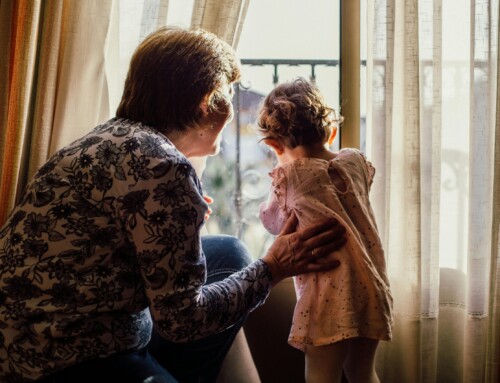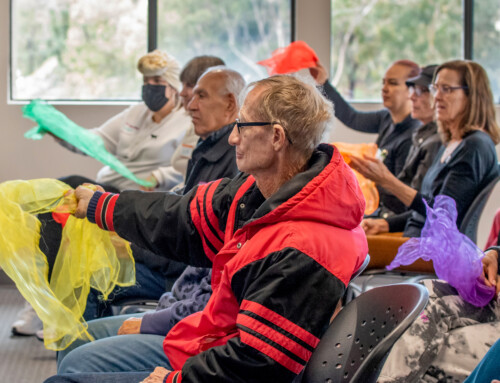
Clinical Care Coach Corner: Written by Lourdes Cabret, LMHCA
From the moment we are born, we go through life facing changes, adapting, and experiencing a wide range of emotions such as fulfillment, happiness, sadness, and anger, among others. All these changes and emotions can transform us and evolve through growth. In this constellation of emotions, we can find grief and loss, an experience that can be confusing and isolating and can leave us feeling heartbroken, as if everything is altered in ways that are difficult to understand.
In the world of dementia, the caregiver and their person are launched into the world of grief at the precise moment that a diagnosis is given by their doctor. The world as they know it looks distant, strange, unfamiliar, and almost enchanted. They will both go from shock to shock in a cycle that might feel like it never ends. This type of grief and loss is called ambiguous loss. In the 1970s, Pauline Boss, PhD, developed the concept of “ambiguous loss” to describe grief that has no closure and is unresolved. Dr. Boss talks in her work about two types of ambiguous loss: one that occurs when there is physical absence with psychological presence, and the second one that occurs when there is psychological absence with physical presence.
We are going to focus on the second type of ambiguous loss, where a loved one is physically present but absent emotionally or cognitively. Dementia is a neurodegenerative disease where the brain neurons are dying or degenerating, causing the brain to shrink. We can’t see the brain changing, but we can see our person fading away slowly while the condition progresses. That person that we once knew is becoming absent; the disease is erasing from their brain who they are as it moves slowly through it. These metamorphoses cannot be controlled and will impact reasoning, the ability to make decisions, personality, behavior, as well as changes in time and space. Our person or loved one walks between the veils of the living and the veil of our ancestors; they are trapped in a different dimension that is unknown to us, making the final transition at the end of the disease.
When witnessing these changes, most care partners deal with ongoing stress, and this starts to negatively impact psychological, physical, and spiritual well-being. People are often trying to manage or suppress reactions. What do we do now with this, and how can we cope with the changes and unresolved grief? Where is my spouse or my mom? I cannot recognize this person anymore. He or she is the love of my life, and now they don’t recognize me or remember me. It is at this point that we need to release pre-conceptions of ideas and start questioning what is going on inside us and how we can find ourselves in this world of dementia. As Dr. Boss describes in her books, ambiguous loss confuses families, prevents resolution of the loss, and freezes the grief process, paralyzing the family from functioning. People navigating ambiguous loss will often describe feeling trapped, unable to move, stuck between the need to grieve and a reluctance to give up hope, an ongoing longing for a return to what was before.
The more we understand the world of ambiguous loss and its impact, the better we position ourselves to understand what is happening and start to build resilience. Dr. Boss proposes six guidelines to build resilience and live well despite ambiguous losses:
- Finding Meaning: Make sense of what is happening, name the problem (dementia), practice dialectical thinking, spirituality, forgiveness, focus on personal positive attributes.
- Regain Control: “It helps to think of two possible answers to ambiguous loss.” They are both here and not here. Externalize blame, decrease self-blame, identify past competencies, look at decisions, increase opportunities for some successes, accept what will not change, and know the exceptions.
- Reconstructing Identity: Be flexible, recognizing what we are or aren’t, gender roles, family roles, themes about family and community.
- Normalizing Ambivalence: Celebrate the small moments and the things they can still do; grief that is no longer possible. Normalizing negative feelings but not harmful actions, using the arts to express and regain personal agency, looking for support.
- Revising Attachment: Acceptance rather than resistance, this is not detachment or denying the loss.
- Discovering New Hope: Focusing on the future and being comfortable with uncertainty.
I want to remind you that grief is unique and different for everyone. It might never go away, but it transforms into something we can live with. Remember to be mindful of every moment, continue to build memories, and most importantly, celebrate the little moments and the things that they can do.
Check out our free support groups, education, social activities, & more. You may also call our office at 858.492.4400 to speak directly to one of our Clinical Care Coaches (Spanish speakers available).
Our “Clinical Care Coach Corner” series is where our dementia experts weigh in on topics they feel are necessary to discuss and provide insight that can help people affected by dementia.






